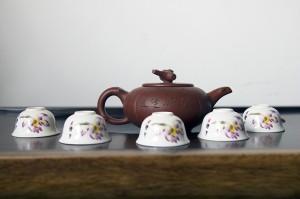In Singapore, there’s a common association of tea- particularly of the ‘Chinese variety’- as the ‘old man’s’ drink or at least the traditional oriental man. It doesn’t help matters that many traditional teahouses play Chinese orchestral music in the background or dress their staff up in cheongsam.
The reality is that the ‘typical Chinese tea drinker’ can come from as varied a range as a ‘typical wine drinker’ or a ‘typical coffee drinker’.
In other words, no one’s typical.
Online Tea Forums

And in fact more than one but the spotlight is on Teachat which is best of my knowledge the oldest tea forum.
Despite being in English and based in USA where most of their members come from, their topics don’t revolve only around Earl Grey or Coconut Oolong and their ilk.
You can see from the screenshot that the forum topics are categorized based on the type of tea. The screenshot was taken on the 15th of Jan 2013 and you can see some of the most recently discussed topics include Pu-er and Oolong tea, 2 distinctively ‘Chinese’ (and Taiwanese) teas.
In contrast, black tea which is commonly perceived to be the ‘English tea’- although there is no clear distinction as I wrote about here- was last updated on the 13th of Jan 2013. Further, an even less ‘Chinese’ drink, namely non-tea plant infusions such as Rooibos etc hadn’t been discussed since Sep’ 12.
In other words, there are active, vocal online communities devoted to the world of tea- including ‘Chinese teas’. While there is no information available on the age group of the members, a look at the language used suggest that at least a sizeable portion do not fall into the ‘old man’ category. Not to mention the fact that oriental old men don’t spend THAT much time on forums.
Profile of Lovers of Gongfu Tea
Chinese tea- at least in predominantly Southern Chinese migrant communities- has often been characterized by gongfu tea or gongfu cha.
Not every gongfu tea apologist is an Oriental old man though.
In our first guest post, we featured Nicole Martin from Tea For Me Please who wrote about how gongfu brewing became part of her tea routine.
You want video evidence?
Try Walker Tea Review where the host Jason Walker reviews predominantly Chinese teas with a gaiwan which you can see on video.
You can start with the video where he reviews our teas J.
Nicole and Jason aren’t secretly Wong Ching Ling or Tan Yew Wee in disguise though. They are young New Jersey-ian and New Yorkers respectively who fell in love with tea just like we do.
Tea and Tourism

Notwithstanding the fact that the best representatives of famous varieties of tea have long been snatched up by wholesalers or fanatics, visitors to these spots often fall in love with the tea they savor at these scenic spots.
Indeed, many a love affair with tea has been birthed from tourism. As tea is best grown at high elevations, many travelers are younger and more adventurous. Hence, a new generation of tea drinkers is born.
The Epicurean Delight
The most importantly reason is simply that taste transcends age and culture.
In terms of diversity, as a tea producing nation, China is unmatched- being the originators of all 6 major categories of tea and the only nation to produce the entire spectrum.
It’s not a mere numbers game though.
Here I wrote about why the best tea in the world is produced in China which despite my obvious vested interest is a logical and objective argument.
Tea is gaining credence among the western world for its epicurean delight. In fact, some of the most fanatical western tea drinkers are Pu-er lovers such as these folks covered in the LA Times.
You don’t need to be an Oriental old man to appreciate good tasting drinks, not any more than you need to be Japanese to love sashimi or French to love wine.
Forget about the oriental old men stereotype. Tea is taking the world by storm once again.
Don’t be left behind.
